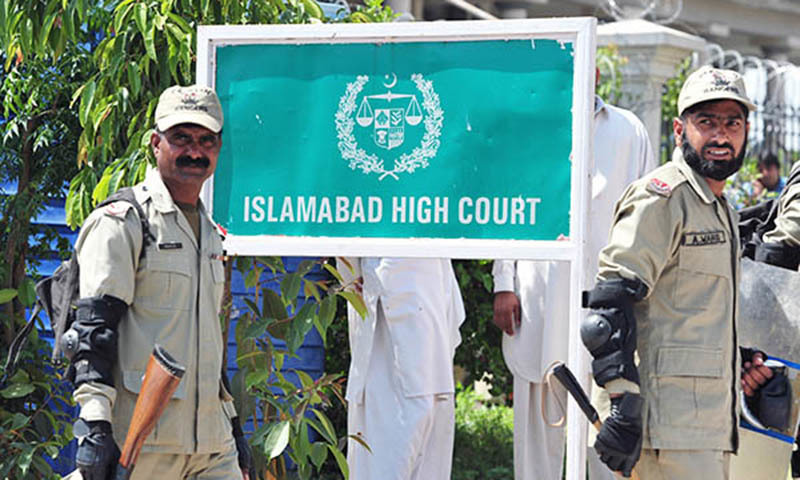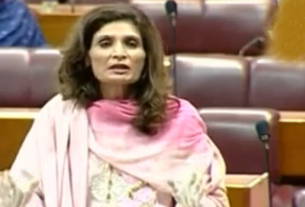ISLAMABAD: The Senate Standing Committee on Law and Justice on Thursday agreed on a bill to increase the number of Islamabad High Court (IHC) judges from seven to 10.
The committee discussed “The Islamabad High Court (Amendment) Bill 2019” introduced by Minister for Law and Justice Dr Farogh Nasim as a government bill calling for increasing the number of judges.
The minister observed that the IHC had emerged as a court getting more and more cases. He said the number of judges also needed to be increased to overcome the pendency of cases.
But Senator Farooq Naek said the existing posts of judges were not filled entirely and increasing the number would be of no use until all the vacancies were filled.
Minister assures committee that govt will amend Islamabad High Court Act to appoint IHC judges only from Islamabad
Islamabad High Court Bar Association President Raja Inam Ameen Minhas informed the committee that against the seven sanctioned posts currently there were only four judges in the IHC.
There are over 18,000 cases pending adjudication in the court, he said.
Committee Chairman Javed Abbasi said there should also be a decision on who can be appointed as a judge of the IHC.
The Islamabad High Court Bar Council and Islamabad High Court Bar Association supported the bill but called for increasing the number of judges to 11 and appointing the judges only from Islamabad.
The committee members supported the bill but deferred it till the next meeting. On the request of lawyers representatives, the law minister assured the committee that the government would bring an amendment to the Islamabad High Court Act to appoint IHC judges only from Islamabad.
As per IHC Act, the judges could be appointed from provinces and territories of Pakistan.
The committee in principle agreed with the amendment bill but asked the ministry to initiate the process for amendment to the High Court Act and bring the same to the next meeting.
The committee also discussed ‘The Ratification of Foreign Agreements by Parliament Bill 2018 moved by Senator Mian Raza Rabbani. He said bringing foreign agreements to parliament would make the process more transparent.
The minister called the bill against the principle of trichotomy of powers as provided by the constitutional scheme.
He said Article 173(3) of the Constitution permits the executive authority to enter into any contract or agreement.
He said there were a number of cases in which the Supreme Court interpreted certain laws as violative of the concept of separation of powers and the laws were struck down. He said bringing contracts to parliament would limit freedom of such contracts. He said this would be an unnecessary clog on the powers of the executive.
Senator Farooq H. Naek said parliament can make laws about how to implement foreign agreements but cannot ratify the agreements. He called for making the required amendments to the bill.
Senator Anwarul Haq Kakar agreed to the point of view of the government while Senator Abdul Rehman Malik supported the bill. Senator Mustafa Nawaz Khokhar said the bill was in good intention and people through parliament needed to know what contracts the government was entering into.
Senator Sherry Rehman supported the bill but also believed that in order to get it through first a constitutional amendment was needed.
Senator Musadik Malik said in a parliamentary democracy there was always an overlap in powers of the executive and legislature.
He said the balance between transparency and expediency had also to be maintained.
The committee decided to further discuss the bill at its next meeting.
It also discussed ‘The Constitution (Amendment) Bill 2018’ (fourth schedule) moved by Senator Syed Sabir Shah regarding uniform printing of Quran in the country. The mover stressed the need for using better quality paper to reduce the damage of paper after long use of the holy book.
Members of the committee supported the essence and intent of the bill but observed that printing had always been a subsidiary subject and taking it away from provinces and having a central authority responsible for printing might not be a good idea.
The chairman of the Council of Islamic Ideology and officials of the ministry of religious affairs and provincial auqaf departments told the meeting that all provinces had passed their respective laws to ensure standard quality error free printing of Quran.
The committee decided to take samples on the grammage of paper in the next meeting and the mover shall withdraw the bill on condition of satisfaction.



